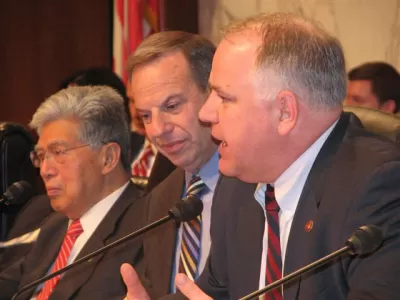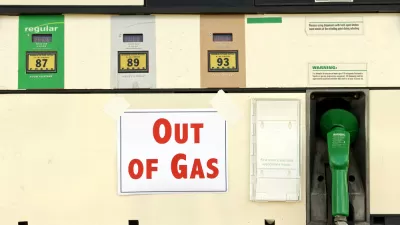Democratic candidate Tim Walz was not shy about his intention to hike the gas tax to pay for improvements for roads and public transit, and he was predictably slammed by his Republican opponent. Similar scenarios played out in Wisconsin and Michigan.

Six-term Congressman Tim Walz beat second-time Republican candidate Jeff Johnson by 12 percent to replace Democratic Gov. Mark Dayton who chose not to run for a third term.
Asked by reporters on Nov. 8 if he still intends to raise the gas tax, Walz responded, "Absolutely,” reports Dave Orrick reports for the Pioneer Press.
He said transportation — specifically roads, highways and bridges — will be a top priority for his administration. And, he said, there’s bipartisan support for that.
"You have to have an honest conversation with the citizens of Minnesota who will pay for things that they know improve this country and this state,” Walz said during a debate last month, reported Brian Bakst for Minnesota Public Radio.
Johnson, who ran 30-second ads at gas stations warning motorists of his opponent's intention to hike gas taxes, "said his approach would be to sell bonds and tap into the general treasury to prioritize highway upgrades," adds Bakst. In California, proponents of an initiative to repeal a 12-cents gas tax increase, also took their campaign to the TV screens at gas stations, with the same result.
Walz's campaign website explained why he wanted to raise the gas tax.
Today, Minnesota no longer raises enough revenue from the gas tax to do much more than maintain our extensive road network. If we want to expand the capacity of our urban freeways, reduce crashes at major suburban intersections, or build new roads connecting one rural town to another, we have to stop fighting over how to divide the pie and start working together to grow the pie.
As to how much Walz intends to hike Minnesota's 28.6-cents gas tax, over a nickel lower than the national average, Walz told the AP in July that a dime would be "a starting point."
Walz and his lieutenant governor running mate, Peggy Flanagan, ran on a liberal platform that also included "spending increases for schools, broader access to publicly funded health insurance, new limits on gun sales and...marijuana legalization," reports J. Patrick Coolican for the Star Tribune.
Bipartisan support?
Suburban voters also elected 11 Democrats to give them a majority in the Minnesota House of Representatives, reports Jessie Van Berkel for the Star Tribune, but the Republicans kept their majority in the State Senate, which is likely to make increasing the gas tax difficult.
Senate Majority Leader Paul Gazelka, R-Nisswa, reaffirmed on Nov. 8 his opposition to hiking that gas tax, reports Orrick.
"When people say they want a gas tax (increase), I think what they’re really saying is ‘We want roads and bridges funded,’ so I think we’re all committed to that.”
But not with a gas tax, Gazelka said. “I think that’s one of the issues we may disagree on.”
Similar outcome in Wisconsin, but a squeaker
As posted last month, two-term Republican Gov. Scott Walker also charged his Democratic opponent with wanting to raise gas taxes, warning voters that Tony Evers would hike gas taxes by as much as a dollar a gallon, and ran video ads at service stations, just like Jeff Johnson and gas tax repeal proponents in California.
"In a stunning upset of the political order in Wisconsin, Democrat Tony Evers won," reported Mark Sommerhauser for the Wisconsin State Journal. The margin was 1.1 percent.
And Michigan too
Former state Senate Minority Leader and new Democratic Gov.-elect Gretchen Whitmer campaigned on raising $2 billion for an infrastructure bank, reports Emily Lawler for MLive. She beat Republican Attorney General Bill Schuette, who, like Walker and Johnson in Wisconsin and Minnesota, respectively, opposed raising gas taxes, by nearly 10 percent.
Whitmer's first preference is to get the money through what her written plans describe as "user fees." Asked if that could include something like registration fee or gas tax increases, she left the door open.
"Possibly. I took a lot of votes when I was in the legislature and I reserve the right to incorporate any of those as a part of the solution, here," Whitmer said.
Related in Planetizen:
-
Scroll down to "State legislators re-elected for supporting gas tax hikes" in "Toll Lane Expansion in Inland Empire Begins After Voters Reject Gas Tax Repeal," Nov. 20.
Hat tip to Rep. Peter DeFazio (D-Ore.) via MarketWatch for highlighting this race.
FULL STORY: Gov.-elect Tim Walz sets up shop at the Capitol. Gas-tax hike for roads? ‘Absolutely.’

Planetizen Federal Action Tracker
A weekly monitor of how Trump’s orders and actions are impacting planners and planning in America.

San Francisco's School District Spent $105M To Build Affordable Housing for Teachers — And That's Just the Beginning
SFUSD joins a growing list of school districts using their land holdings to address housing affordability challenges faced by their own employees.

The Tiny, Adorable $7,000 Car Turning Japan Onto EVs
The single seat Mibot charges from a regular plug as quickly as an iPad, and is about half the price of an average EV.

Seattle's Plan for Adopting Driverless Cars
Equity, safety, accessibility and affordability are front of mind as the city prepares for robotaxis and other autonomous vehicles.

As Trump Phases Out FEMA, Is It Time to Flee the Floodplains?
With less federal funding available for disaster relief efforts, the need to relocate at-risk communities is more urgent than ever.

With Protected Lanes, 460% More People Commute by Bike
For those needing more ammo, more data proving what we already knew is here.
Urban Design for Planners 1: Software Tools
This six-course series explores essential urban design concepts using open source software and equips planners with the tools they need to participate fully in the urban design process.
Planning for Universal Design
Learn the tools for implementing Universal Design in planning regulations.
Smith Gee Studio
City of Charlotte
City of Camden Redevelopment Agency
City of Astoria
Transportation Research & Education Center (TREC) at Portland State University
US High Speed Rail Association
City of Camden Redevelopment Agency
Municipality of Princeton (NJ)





























